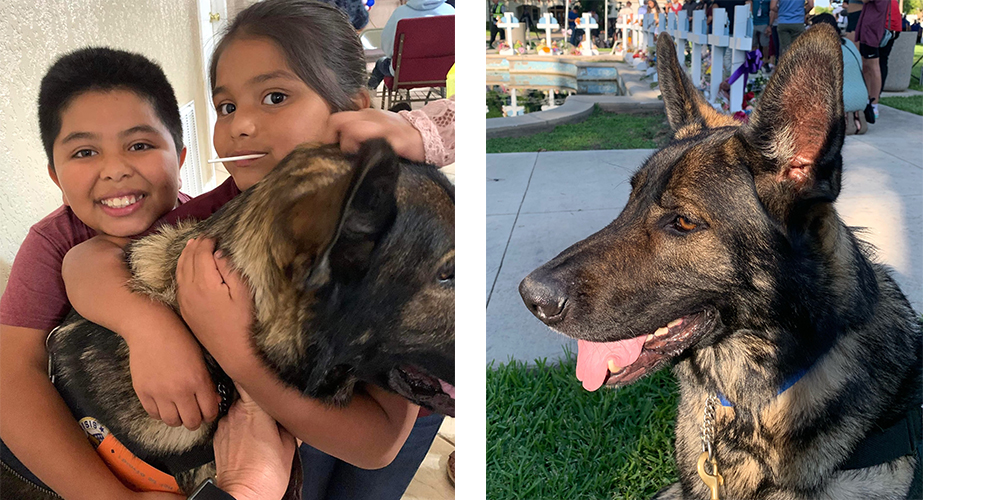After the latest round of mass shootings, especially the one in Uvalde, Texas where 21 people, including 19 children were killed, we could all use some wisdom and encouraging words.
A quote from Mr. Rodgers started circulating after the Sandy Hook school massacre as a way to help children digest the tragedy.
“When I was a boy and I would see scary things in the news, my mother would say to me, look for the helpers. You will always find people who are helping.”
There are indeed many helpers who respond to such events, some residing in our immediate area.
Mullica Hill resident Nancy Mittleman is a volunteer for Crisis Response Canines. She joined the Sicklerville-based organization in February of 2020 when her foster dog, Tarik, was removed from consideration as a seeing-eye guide dog due to the beginnings of elbow dysplasia.
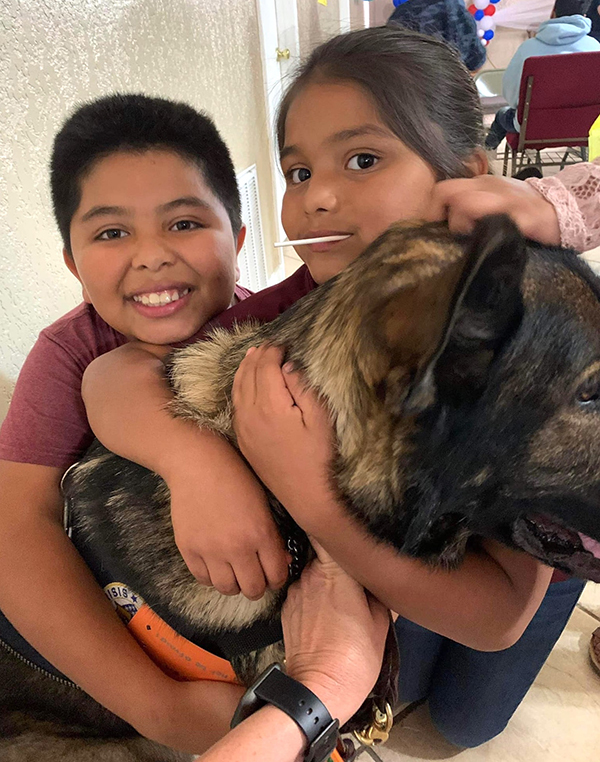
Mittleman, having raised seven puppies for The Seeing Eye guide dog school, knew that Tarik was special and did not want his skills to be wasted.
After adopting Tarik, the duo began hospice therapy work for Bayada, the organization that provided hospice care to Mittleman’s father. Then, a friend who was involved in Crisis Response Canines encouraged her to consider the organization.
Crisis Response Canines (CRC) is a volunteer-based non-profit co-founded by Andrea Hering and John Hunt in 2018 and offers support to those impacted by personal or community crisis.
“I did my research and was impressed with the professionalism of the organization, so I applied and was accepted,” Mittleman said.
The organization is comprised of two team levels, each with a canine and human handler. Comfort teams visit hospitals, schools, nursing homes, businesses, first responder stations, community events, speaking events, and other similar opportunities.
Operational Deployment teams have the capability to respond to national crisis events. The organization has established a nationwide network of teams that can be deployed immediately in the aftermath of tragic events. Mittleman and Tarik are both comfort team and deployment team members.
Professional psychologists within the organization provide guidance regarding the training of handlers, and due to the nature of crisis therapy, additional training is extensive and thorough.
All teams require certification from the Alliance of Therapy Dogs and AKC Canine Good Citizen. Operational Deployment team training also includes the AKC Canine Good Citizen Advanced, Canine Good Citizen Urban Certification, CRC Crisis Working Dog Certification, Law Enforcement Defensive Systems Crisis Working Dog Certification, and specific courses associated with FEMA, healthcare, mental and behavioral health for handlers.
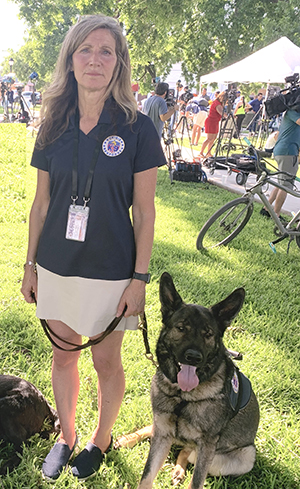
“Tarik began working comfort details with CRC and after gaining experience and attending training, we were considered for deployment work,” Mittleman explained.
Mittleman said that CRC dogs serve as a tactical component of the “Critical Incident Stress Model,” where appropriately trained crisis response canines have been found to be a viable support to individuals and groups impacted by traumatic events.
It is important to note that CRC do not respond to a tragic event on their own, but are always assigned through the incident command or another designated branch, and work in collaboration with the Victim Advocacy Branch who have counselors and other professionals assigned.
Mittleman explained the interaction of CRC and trauma victims.
“It is our initial goal to help dissociate the individual or group from the traumatic experience. Most certainly, we have found our canines help the individuals and/or groups to decompress.
“For those that we may spend additional time with, the canines provide companionship for their journey toward recovery. When working in conjunction with healthcare professionals, we have observed firsthand the positive impact of our CRC canines and handlers,” she added.
Mittleman explained how handlers are trained to use the canines as a bridge to recovery for those they interact with.
“Many times, when we first interact with individuals, they are reluctant to talk. Sometimes they just sit and pet the dog. Sometimes they pet the dog and we talk about other things. Sometimes they begin confiding directly to the dog, and sometimes they eventually unburden themselves to us as well. But the main point is that they are communicating. The dog provides the therapeutic bridge to make that communication happen.”
Members of CRC have been deployed to many past major tragedies, including the 2016 Pulse Nightclub shooting in Orlando, the 2017 Las Vegas Harvest Route 91 Festival shooting, and the 2018 high school shooting in Parkland, Florida.
More recently, teams have been deployed to the January 2022 Baltimore fatal fire, the February 2022 Bridgewater College shooting in Virginia, The May 2022 Topps Supermarket shooting in Buffalo, and the June 2022 Robb Elementary School shooting in Uvalde, Texas.
During the two years they’ve been serving, Mittleman and Tarik have been part of several of these major deployments as well as others, including the Surfside Florida Champlain Towers Condominium collapse, the Jefferson Hospital shooting in Philadelphia, The Bridgewater College shooting, Pennsylvania State Trooper viewings, the Kensington fatal house fire in Philadelphia, and the Uvalde school shooting.
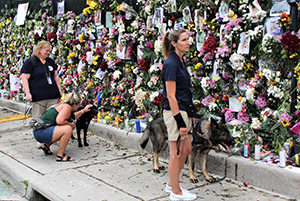
When asked how she handles being involved in the aftermath of such tragedy without becoming overwhelmed and depressed, Mittleman explained her approach.
“No deployment is easy, but I focus on the interactions I have and the difference I hope to make rather than the tragedy itself. If during a deployment I [can] provide respite from the despair someone is experiencing—even if it is one person for five minutes, and that is never the case—then I feel that Tarik and I have done our job.”
Teams at CRC adhere to a “sacred trust” policy with those they comfort by not disclosing specifics of interactions, including keeping private conversation confidential, and never taking photos of someone grieving.
“That is too personal and private,” Mittleman began. “The whole concept of CRC is to provide people decompression and perhaps that brief moment of respite from all the pain and suffering around them.”
In some circumstances, trauma victims wish to share details of their interactions, and one such example is investigator Erica Hooker.
Hooker was a Bridgewater police officer in February 2022 when two Bridgewater College campus security officers she knew were fatally shot by a former student on the campus.
Hooker encountered Nancy and Tarik at a prayer vigil and found engaging with the dogs to be extremely beneficial.
“I am so grateful that CRC traveled to Virginia. It helped me in ways I didn’t know I needed. I will never forget Tarik, and how warm and welcoming Nancy was. Being with them helped me through the start of the week and that made the biggest difference for me,” she began.
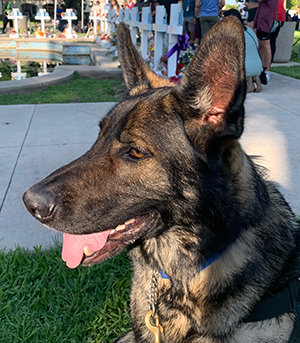
“These moments and experiences of comfort are SO important especially in the lives of the children and parents who experienced the unthinkable in Uvalde.”
“I think it’s important for CRC to be reminded often that each of their sacrifices to make deployments happen and their compassion in the midst of chaos is truly appreciated. CRC remains in the forefront of my mind and heart,” Hooker concluded.
Mittleman speaks in general terms about her most recent deployment to Uvalde, Texas.
“Every deployment is different, but I learn things about myself and frankly about humanity on every deployment. In this past deployment, I left home with a very heavy heart, wondering ‘how could these families ever heal?’
“And while I still don’t know the answer to that question, I do know that by showing up, by being present for this community, we made a difference,” she continued.
“I heard from many of the families that they found strength in the compassion of friends and surprisingly, of strangers. Time and again, we were thanked for traveling across the country with the dogs and were consistently told how valuable the comfort was.
“When people witnessed the effect that the dogs had, we were requested to participate in numerous additional events. THAT is what is truly rewarding, to know that we are needed and are making a difference,” she concluded.
As an all-volunteer, non-profit organization funded solely by donations, Crisis Response Canines welcome the involvement and help of community members.
Donations help pay for everyday expenses like uniforms, training, insurance, and printing needs, as well transportation costs and lodging for deployments. (National deployments can cost $20,000 or more to send six canine-handler teams.)
Those considering volunteering, donating, or sponsoring Crisis Response Canines can visit their website at crisiscanines.org or their Facebook page at CrisisCanines.
By Colleen Woods-Esposito

